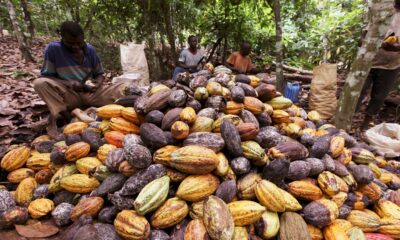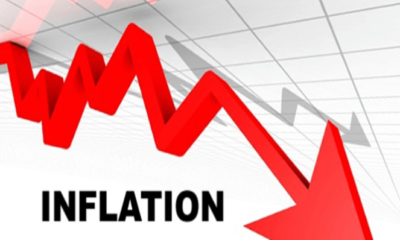Strictly Personal
How Ghana can map its energy transition journey by Nafi Chinery
Published
2 years agoon
The good news is that Ghana now has a golden opportunity to develop a comprehensive and context-specific plan for navigating the global energy transition. In response to COP26 and Ghanaian CSOs’ demands for a national energy transition policy, the government launched the National Energy Transition Committee (NETC) in December 2021. The committee is tasked with developing a national policy document on steps the country can take to successfully navigate the global energy transition.
All countries have a vital role and interest in avoiding catastrophic climate impacts and safeguarding a livable planet. Like the citizens of most developing countries, Ghanaians are increasingly affected by climate change, despite bearing little responsibility for the emissions that are causing it.
At the COP26 climate conference last year, governments reaffirmed their commitment to the goal of limiting global warming to 1.5°C. Achieving this will require a colossal and unprecedented shift away from fossil fuels to renewable energy sources like wind and solar — as well as the provision of clean, affordable and reliable energy for the nearly one billion people currently living without it.
The wealthiest countries that have polluted the most should hold the primary responsibility for tackling climate change, both in cutting their emissions first and fastest, and in providing climate finance and support to countries like Ghana. Ghana’s President Nana Akufo-Addo emphasised this responsibility during COP26 when he called for a fair and equitable solution that “recognises the historical imbalances between the high emitters and low emitters.”
To date, however, wealthy countries have under-promised and underdelivered. They have yet to reduce emissions to the extent necessary to avoid warming beyond 2°C, let alone 1.5°C. And, as President Akufo-Addo also mentioned, they have failed to honour their 2010 promise of $100 billion per year to support developing countries’ responses to climate change. Tragically, the consequences will be felt by all for decades to come.
Ghana’s agency in the energy transition
Despite this compound injustice and these broken promises, Ghana’s future ultimately depends on its own leadership and effective planning. Ghana is still a resource-dependent country, with more than a quarter of its export earnings coming from oil and gas alone. Over the past decade, the oil sector has contributed around $6.5 billion of direct revenue to Ghana’s budget. Without a plan to respond to the global energy transition, a significant decline in oil revenues could plunge Ghana into a deep crisis.
In the last decade, the government has allocated $2 billion to the Ghana National Petroleum Corporation (GNPC). These investments have financed equity stakes in exploration, development and general operations in oil-producing fields. NRGI’s Risky Bet report shows that, globally, oil and gas projects currently in the pipeline and worth an estimated $400 billion, run the risk of not breaking even.
At a minimum, the government should avoid making bad decisions — those that threaten the country’s economic and fiscal outlook. But Ghana’s record does not inspire confidence. In the last decade, the government has allocated $2 billion to the Ghana National Petroleum Corporation (GNPC). These investments have financed equity stakes in exploration, development and general operations in oil-producing fields. NRGI’s Risky Bet report shows that, globally, oil and gas projects currently in the pipeline and worth an estimated $400 billion, run the risk of not breaking even. Against the backdrop of the global energy transition, GNPC’s ambitions of becoming an operator are risky.
In July 2021, Ghana’s Ministry of Energy and GNPC declared their intention to sink an additional $1.65 billion of public money into shares of Aker Energy’s oil project — yet another “risky bet” given the increasing pace of the global energy transition, which would result in poor returns on such a large-scale investment. Furthermore, such a decision would divert precious capital that the government could invest in more socially beneficial programmes, such as education or cheaper and more diverse energy sources, that could power development in Ghana. Thankfully, after severe criticism from civil society organisations, the public and industry oversight bodies in Ghana, the government paused its investment plans in the Aker shares.
No doubt, Ghana’s economic and fiscal outlook is uncertain. The 2018/19 oil licensing round remains unconcluded and oil production is projected to decline. International companies are redirecting their investments, and projects have been delayed. State oil revenues peaked in 2018, at 10 per cent of total government revenue, and dropped to seven per cent in 2020, due to the coronavirus pandemic. The ongoing war between Russia and Ukraine and the related global energy crisis now present huge uncertainties for the oil sector, including the prospect of a global recession.
The good news is that Ghana now has a golden opportunity to develop a comprehensive and context-specific plan for navigating the global energy transition. In response to COP26 and Ghanaian CSOs’ demands for a national energy transition policy, the government launched the National Energy Transition Committee (NETC) in December 2021. The committee is tasked with developing a national policy document on steps the country can take to successfully navigate the global energy transition. The NETC is also tasked with conducting a nationwide consultation on Ghana’s energy transition. At the first regional forum organised by the Ministry of Energy on behalf of the NETC, Vice President Dr Mahamudu Bawumia said the NETC’s nationwide consultations are key to success: “We need to develop plans and implement options that people can relate to.” He also stressed the importance of equal opportunities for all citizens to enjoy the benefits of the energy transition and ensure social justice in the process.
The transition plans must address Ghana’s growing energy needs. Decisions about energy sources and related services should be based on analysing different solutions over the long term, mindful of the likelihood that many factors (such as the competitiveness of renewables and gas) may change quickly over the coming decade. Accordingly, the NETC should review the role of fossil gas over the course of the transition…
Essential elements for Ghana’s approach
The establishment of the NETC is an important and valuable first step. The following recommendations, if adopted, would put the committee on track to deliver a successful energy transition plan:
- Include all voices. Ghana’s plan should be inclusive and leave no citizen behind. The plan should address how government will support local economies with relevant training, technology and finances to take advantage of the new opportunities in the transition;
- Enlist experts. The NETC should engage sector experts working on the energy transition to help ensure that the plan is informed by data and technical analysis;
- Promote open dialogue. Open and honest engagement between all relevant stakeholders will help build consensus and ownership around a transition pathway that is widely considered by citizens as viable and necessary. A shared understanding of the risks and opportunities of the energy transition is critical to agree on a shared strategy;
- Plan in harmony and coordination with existing policies. The energy transition plan should harmonise existing policy objectives and remedy the systemic inefficiencies in existing policy implementation;
- Improve governance of climate finance. The Ministry of Finance should spell out the role of international climate finance in energy transition planning and interrelate the energy transition plan with Ghana’s (conditional) nationally determined contributions under the Paris Agreement. Across the board, this requires building the state’s capacity to receive and deploy international climate finance;
- Take a critical and dynamic approach to energy options. The transition plans must address Ghana’s growing energy needs. Decisions about energy sources and related services should be based on analysing different solutions over the long term, mindful of the likelihood that many factors (such as the competitiveness of renewables and gas) may change quickly over the coming decade. Accordingly, the NETC should review the role of fossil gas over the course of the transition — not assume from the outset that gas will be a constant;
- Assess implications for existing institutions. Ghana’s energy transition plan should consider the role of existing institutions such as GNPC in light of the long-term, macro pathway, rather than starting with assumptions about their purpose and role. Making the right investment decisions will require transparency and robust risk assessment.
Nafi Chinery is the West Africa (Anglophone) regional manager at the Natural Resource Governance Institute (NRGI).
You may like
-


Bean disease affects 81% of major cocoa region in Ghana
-


Ghana: Inflation decreases to 22.8%
-


Mohammed Kudus promotes Ghanaian jollof during West Ham pre-season training
-


Ghana’s Energy Minister Prempeh selected as Bawumia’s presidential running mate
-


University of Ghana hosts exhibition on slavery at Elmina Castle
-


Ghanaian star Kudus in new ad for footwear makers Skechers along with Kane, Zinchenko, Elanga (Video)
Strictly Personal
All eyes in Africa are on Kenya’s bid for a reset, By Joachim Buwembo
Published
5 days agoon
July 21, 2024
Whoever impregnated Angela Rayner and caused her to drop out of school at the tender age of 16 with no qualifications might be disappointed that we aren’t asking who her baba mtoto (child’s father) is; whether he became a president, king or a vagabond somewhere, since the girl ‘whose leg he broke’ is now UK’s second most powerful person, 28 years since he ‘stole her goat’.
Angela’s rise to such heights after the adversity should be a lesson to countries which, six decades after independence, still have millions of citizens wallowing in poverty and denied basic human dignity, while the elite shamelessly flaunt obscene luxury on their hungry, twisted faces.
After independence, African countries also suffered their adolescent setbacks in the form of military coups. Uganda’s military rule lasted eight years, Kenya’s about eight hours on August 1, 1982, while Tanzania’s didn’t materialise and its first defence chief became an ambassador somewhere.
What we learn from Angela Rayner is that when you’re derailed, it doesn’t matter who derailed you, because nobody wants to know. What matters is that you pick yourself up, not just to march on, but to stand up and shine.To incessantly blame our colonial and slave-trading ‘derailers’ while we treat our fellow citizens worse than the colonialists did only invites the world to laugh. Have you ever read of a colonial officer demanding a bribe from a local before providing the service due?
African countries today need to press ‘reset’. A state operates by written policies, plans, strategies and prescribed penalties with gazetted prisons for those who break the rules. This is far more power than teenage Angela had, so a reset state should take less time to become prosperous than the 28 years it took her to get to the top after derailing.
So it’s realistic for countries to operate on five-year planning and electoral cycles, so a state that fails to implement a programme in five years has something wrong with it. It needs a reset.
A basic reset course for African leaders and economists should include:
1. Mindset change: Albert Einstein teaches us that no problem can be solved from the same level of consciousness that created it. For example, if you are in debt, seeking or accepting more debt is using the same level of thinking that put you there. If you don’t like Einstein’s genius, you can even try an animal in the bush that falls into a hole and stops digging. Our economists are certainly better than a beast in the bush.
2. Stealing is wrong: African leaders and civil servants need to revisit their catechism or madarasa – stealing public resources is as immoral as rape.
3. Justifying wrong doesn’t make it right: Using legalese and putting sinful benefits in the budget is immoral and can incite the deprived to destroy everything.
4. Take inventory of your resources and plan to use them: If Kenya, for example, has a railway line running from Mombasa to Nairobi, is it prudent to borrow $3.6 billion to build a highway parallel to it before paying off and electrifying the railway?
If Uganda is groaning under a $2 billion annual petrol import bill, does it make sense to beg Kenya for access to import more fuel, when Kampala is already manufacturing and marketing electric buses, while failing to use hundreds of megawatts it generates, yet the country has to pay for the unused power?
If Tanzania… okay, TZ has entered the 21st Century with its electric trains soon to be operating between Dar es Salaam and Morogoro. Ethiopia, too, has connected Addis Ababa to the port of Djibouti with a 753-kilometre electric railway, and moves hundreds of thousands of passengers in Addis every day by electric train.
5. Protect the environment: We don’t own it, we borrowed it from our parents to preserve it for our children. Who doesn’t know that the future of the planet is at stake?
6. Do monitoring and evaluation: Otherwise you may keep doing the same thing that does not work and hope for better results, as a sage defined lunacy.
7. Don’t blame the victims of your incompetence: This is basic fairness.
We could go on, but how boring! Who doesn’t know these mundane points? We are not holding our breath for Angela’s performance, because if she fails, she will be easily replaced. Africa’s eyes should now be on Kenya to see how they manage an abrupt change without the mass bloodshed that often accompanies revolutions.
Strictly Personal
The post-budget crisis in Kenya might be good for Africa, after all, By Joachim Buwembo
Published
2 weeks agoon
July 10, 2024
The surging crisis that is being witnessed in Kenya could end up being a good thing for Africa if the regional leaders could step back and examine the situation clinically with cool-headed interest. Maybe there is a hand of God in the whole affair. For, how do explain the flare not having started in harder-pressed countries such as Zambia, Mozambique and Ghana?
As fate would have it, it happened in East Africa, the region that is supposed to provide the next leadership of the African Union Commission, in a process that is about to start. And, what is the most serious crisis looming on Africa’s horizon? It is Debt of course.
Even the UN has warned the entire world that Africa’s debt situation is now a crisis. As at now, three or four countries are not facing debt trouble — and that is only for now.
There is one country, though, that is virtually debt-free, having just been freed from debt due to circumstances: Somalia. And it is the newest member of the East African Community. Somalia has recently had virtually all its foreign debt written off in recognition of the challenges it has been facing in nearly four decades.
Why is this important? Because debt is the choicest weapon of neocolonialists. There is no sweeter way to steal wealth than to have its owners deliver it to you, begging you, on all fours, to take it away from them, as you quietly thank the devil, who has impaired their judgement to think that you are their saviour.
So?
So, the economic integration Africa has embarked on will, over the next five or so years, go through are a make-or-break stage, and it must be led by a member that is debt-free. For, there is no surer weapon to subjugate and control a society than through debt.
A government or a country’s political leadership can talk tough and big until their creditor whispers something then the lion suddenly becomes a sheep. Positions agreed on earlier with comrades are sheepishly abandoned. Scheduled official trips get inexplicably cancelled.
Debt is that bad. In African capitals, presidents have received calls from Washington, Paris or London to cancel trips and they did, so because of debt vulnerability.
In our villages, men have lost wives to guys they hate most because of debt. At the state level, governments have lost command over their own institutions because of debt. The management of Africa’s economic transition, as may be agreed upon jointly by the continental leaders, needs to be implemented by a member without crippling foreign debt so they do not get instructions from elsewhere.
The other related threat to African states is armed conflict, often internal and not interstate. Somalia has been going through this for decades and it is to the credit of African intervention that statehood was restored to the country.
This is the biggest prize Africa has won since it defeated colonialism in (mostly) the 1960s decade. The product is the new Somalia and, to restore all other countries’ hope, the newly restored state should play a lead role in spreading stability and confidence across Africa.
One day, South Sudan, too, should qualify to play a lead role on the continent.
What has been happening in Kenya can happen in any other African country. And it can be worse. We have seen once promising countries with strong economies and armies, such as Libya, being ravaged into near-Stone Age in a very short time. Angry, youthful energy can be destructive, and opportunistic neocolonialists can make it inadvertently facilitate their intentions.
Containing prolonged or repetitive civil uprisings can be economically draining, both directly in deploying security forces and also by paralysing economic activity.
African countries also need to become one another’s economic insurance. By jointly managing trade routes with their transport infrastructure, energy sources and electricity distribution grids, and generally pursuing coordinated industrialisation strategies in observance of regional and national comparative advantages, they will sooner than later reduce insecurity, even as the borders remain porous.
EDITOR’S PICK


Trevor Noah set for ‘Off the Record’ world tour
South African comedian and talk show host, Trevor Noah, has announced a date for his “Off The Record” global tour...


SA mobility startup LULA acquires UK-based Zeelo’s operations
South Africa’s mobility startup, LULA, has announced the acquisition of the operations of UK-based Zeelo in a move that will...


Ngannou accuses Joshua of employing dirty tactics in their fight in Saudi Arabia
Former UFC heavyweight champion, Francis Ngannou, has accused British-Nigerian boxer, Anthony Joshua, and his promotion team of employing unfair and...


#EndBadGovernance Protests: Please be patient with Tinubu’s govt, monarchs beg Nigerian youths
Some prominent traditional rulers in Nigeria have pleaded with Nigerian youths and organizers of the planned nationwide #EndBadGovernance protests scheduled...


UNESCO removes Senegal’s Niokolo-Koba National Park from list of World Heritage sites in danger
The United Nations’ Educational, Scientific and Cultural Organization (UNESCO) has removed Senegal’s Niokolo-Koba National Park from the list of World...


At Project Aliyense discourse, panelists call for balance between free speech, ethical considerations
The government has been urged to balance freedom of speech with ethical considerations and laws that prevent harm to others....


Adenia Partners acquires Air Liquide’s operations in 12 African countries
Adenia Partners, a leading private equity firm, has completed the acquisition of Air Liquide’s operations in 12 African countries, adopting...


We will handle planned nationwide protests as family matter— Nigerian Govt
The Nigerian government says it will handle the planned #EndBadGovernance protests scheduled to commence on August 1 as a family...


Veteran Nigerian entertainer Charly Boy vows to divorce wife if Kamala Harris doesn’t win US presidential election
Veteran Nigerian entertainer, Charles Oputa, popularly known as Charly Boy, has vowed to divorce his wife of 47 years if...


Saudi club Al Hilal places African transfer record bid for Osimhen
Saudi Arabia club side, Al-Hilal, have reportedly made an African transfer record bid for Super Eagles and Napoli striker, Victor...
Trending
-

 Sports1 day ago
Sports1 day agoMeet Nigerian-born players doing big things for Japan at Paris 2024 Olympics
-

 Metro2 days ago
Metro2 days agoWe will handle planned nationwide protests as family matter— Nigerian Govt
-

 Metro15 hours ago
Metro15 hours ago#EndBadGovernance Protests: Please be patient with Tinubu’s govt, monarchs beg Nigerian youths
-

 Tech2 days ago
Tech2 days agoAdenia Partners acquires Air Liquide’s operations in 12 African countries


